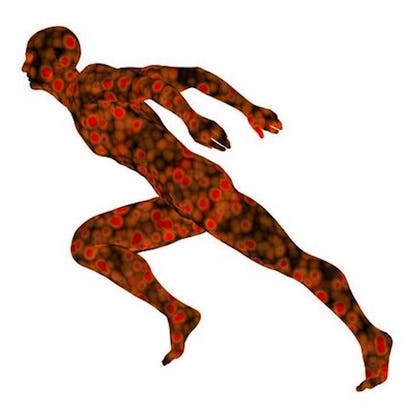- Level Foundation
- المدة 10 ساعات hours
- الطبع بواسطة University of Colorado Boulder
-
Offered by

عن
Learners who complete Science of Exercise will have an improved physiological understanding of how your body responds to exercise, and will be able to identify behaviors, choices, and environments that impact your health and training. You will explore a number of significant adjustments required by your body in order to properly respond to the physical stress of exercise, including changes in carbohydrate, fat and protein metabolism, nutritional considerations, causes of muscle soreness & fatigue, and the effectiveness and dangers of performance enhancing drugs. Active learning assessments will challenge you to apply this new knowledge via nutrition logs, heart rate monitoring, calculations of your total daily caloric expenditure and body mass index (BMI). Finally, learners will examine the scientific evidence for the health benefits of exercise including the prevention and treatment of heart disease, diabetes, cancer, obesity (weight loss), depression, and dementia.الوحدات
Videos
8
Videos
- 1. Introduction to Exercise Science
- 2. Principles in Exercise Physiology
- 3. Calorimetry & Oxygen Consumption
- 4. ATP & Muscular Work
- 5. Carbohydrate Metabolism During Exercise
- 6. Carbohydrate Metabolism Continued
- 7. Fat Metabolism During Exercise
- 8. Protein Metabolism During Exercise
Week 1 Assessments
1
Assignment
- Week 1 Quiz
2
Discussions
- Homeostasis and Exercise
- Please share your feedback on Week 1 Quiz
1
Readings
- Week 1 Suggested Readings
Videos
7
Videos
- 1. Skeletal Muscle Structure & Function
- 2. Respiratory System Responses to Exercise
- 3. Cardiovascular System Responses to Exercise
- 4. Cardiovascular System Continued
- 5. Endocrine System Responses to Exercise
- 6. Endocrine System Continued
- 7. Immune System Responses to Exercise
Week 2 Assessments
1
Assignment
- Week 2 Quiz
1
Discussions
- Type 1 Fibers and the Endurance Athlete
2
Readings
- Week 2 Suggested Readings
- Application Assignment: Predicting VO2max
Videos
7
Videos
- 1. Adaptations to Endurance Training
- 2. Adaptations to Strength Training
- 3. Nutritional Considerations for Exercise
- 4. Causes of Muscle Fatigue
- 5. Causes of Muscle Soreness
- 6. Performance Enhancing Drugs
- 7. Performance Enhancing Drugs Continued
Week 3 Assessments
1
Assignment
- Week 3 Quiz
1
Discussions
- Performance Enhancing Drugs
2
Readings
- Week 3 Suggested Readings
- Application Assignment: Nutritional Calculator
Videos
7
Videos
- 1. Exercise is Medicine
- 2. Diet, Exercise and Weight Control
- 3. Exercise and Risk Factors for Heart Disease
- 4. Exercise and Risk Factors for Diabetes
- 5. Exercise and Risk Factors for Cancer
- 6. Exercise and Successful Aging
- 7. Exercise and Your Brain
Week 4 Assessments
1
Assignment
- Week 4 Quiz
1
Discussions
- Health Benefits of Exercise
5
Readings
- Week 4 Suggested Readings
- Application Assignment: Calculate Your BMI
- Application Assignment: Calculate Your Risk for Heart Disease
- Application Assignment: Calculate Your Risk for Type 2 Diabetes
- Application Assignment: Calculate TDEE
Final Course Assessment
1
Peer Review
- Final Course Assessment
Auto Summary
Discover the "Science of Exercise" course on Coursera, designed for those interested in understanding the physiological impact of exercise on the body. Led by expert instructors, this foundational course covers metabolism, nutrition, muscle function, and performance-enhancing drugs. Learners will engage in active assessments and explore the health benefits of exercise in preventing diseases. Suitable for all levels, the course spans 600 minutes and offers a starter subscription option, ideal for anyone looking to improve their health and training knowledge.

Robert Mazzeo, Ph.D.


